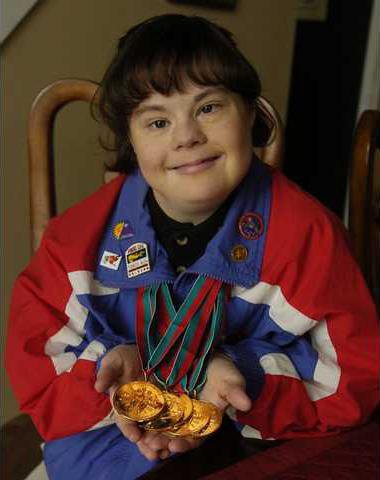Katy Wilson has many reasons to be proud.
In addition to holding a private audience with then-Presidents Bill Clinton and George H.W. Bush, she’s also won hundreds of medals in various athletic competitions.
No, Wilson isn’t an ordinary athlete — she’s special. A Special Olympics athlete, to be exact.
“I’ve participated in the Special Olympics for almost 23 years,” said Wilson, a 28-year-old Gainesville resident.
“I participate in bowling, artistic gymnastics and rhythmic gymnastics.”
Wilson also is a global messenger for the Special Olympics. As a messenger, she travels around the world spreading the Special Olympics message about the importance of “encouraging and empowering people with intellectual disabilities, promoting acceptance for all, and fostering communities of understanding and respect worldwide.”
Most recently, Wilson’s travels took her to Washington for the annual Special Olympics Capitol Hill Day. During the event, Special Olympic athletes from around the country have the opportunity to meet with the congressional representatives from their state.
“I wasn’t nervous at all,” said Wilson. “I just asked them to please continue supporting the Special Olympics in the (fiscal year 2010) budget. I told them that the Special Olympics are very important because they give us confidence and we get to train and go to competitions.”
Wilson credits the Special Olympics with helping her to be a more confident person and develop leadership skills that she can use on a daily basis.
In addition to asking for continued financial support, the state representative athletes also asked lawmakers to reauthorize the Special Olympics Sport and Empowerment Act of 2004. Although the action to reauthorize the act won’t be required until October, the athletes wanted to get an early start in seeking support for the measure.
The act provides for additional funding for Special Olympic health, educational and sports programs.
One of the programs that has benefited from the act is Special Olympics Healthy Athletes. Through the program, health screenings are provided to athletes who may not have had access to medical care otherwise.
“I want Special Olympics to keep going and to keep growing,” Wilson said.
Since being established in 1968 by Eunice Kennedy Shriver, Special Olympics has grown into a worldwide organization with more than 3 million athletes in more than 180 countries.

